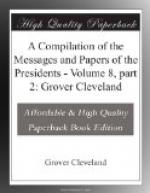Secondly. We can not permanently prevent their action. If we arrest them, we can not long hold them as prisoners, and when liberated they will immediately reassemble and take their action; and precisely the same if we simply disperse them—they will immediately reassemble in some other place.
I therefore conclude that it is only left to the Commanding General to watch and await their action, which, if it shall be to arm their people against the United States, he is to adopt the most prompt and efficient means to counteract, even, if necessary, to the bombardment of their cities and, in the extremest necessity, the suspension of the writ of habeas corpus.
Your obedient servant,
ABRAHAM LINCOLN.
The COMMANDING GENERAL OF THE ARMY OF THE UNITED STATES:
You are engaged in suppressing an insurrection against the laws of the United States. If at any point on or in the vicinity of any military line which is now or which shall be used between the city of Philadelphia and the city of Washington you find resistance which renders it necessary to suspend the writ of habeas corpus for the public safety, you personally, or through the officer in command at the point where resistance occurs, are authorized to suspend that writ.
Given under my hand and the seal of the United States, at the city of Washington, this 27th day of April, 1861, and of the Independence of the United States the eighty-fifth.
ABRAHAM LINCOLN.
By the President of the United States:
WILLIAM H. SEWARD,
Secretary of State.
GENERAL ORDERS, No. 13.
WAR DEPARTMENT,
ADJUTANT-GENERAL’S OFFICE,
Washington, April 30, 1861.
The President directs that all officers of the Army, except those who have entered the service since the 1st instant, take and subscribe anew the oath of allegiance to the United States of America, as set forth in the tenth article of war.
Commanding officers will see to the prompt execution of this order, and report accordingly.
By order:
L. THOMAS,
Adjutant-General.
To all who shall see these presents, greeting:
Know ye that, reposing special trust and confidence in the patriotism, valor, fidelity, and ability of Colonel Robert Anderson, United States Army, I have empowered him, and do hereby empower him, to receive into the Army of the United States as many regiments of volunteer troops from the State of Kentucky and from the western part of the State of Virginia as shall be willing to engage in the service of the United States for the term of three years upon the terms and according to the plan proposed by the proclamation of May 3, 1861, and General Orders, No. 15, from the War Department, of May 4, 1861.
The troops whom he receives shall be on the same footing in every respect as those of the like kind called for in the proclamation above cited, except that the officers shall be commissioned by the United States. He is therefore carefully and diligently to discharge the duty hereby devolved upon him by doing and performing all manner of things thereunto belonging.




